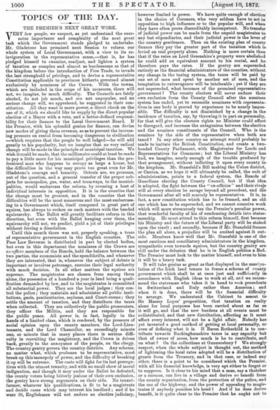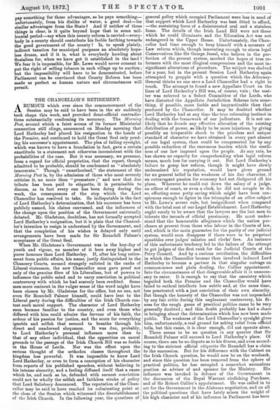TOPICS OF THE DAY.
THE PREMIER'S NEXT GREAT WORK.
VERY few people, we suspect, as yet understand the enor- ra6us importance and complexity of the next great task which the Government stands pledged to undertake. Mr. Gladstone has promised next Session to reform our whole system of Local Government, with a view to its re- invigoration in the representative sense,—that is, he has pledged himself to examine, readjust, and lighten a system of taxation as complex and almost as burdensome as that of the kingdom before the introduction of Free Trade, to invade the last stronghold of privilege, and to devise a representative Constitution applicable to provinces hitherto governed almost exclusively by nominees of the Crown. With the towns, which are included in the scope of his measures, there will not, we imagine, be much difficulty. The Councils are fairly elected, do not job much, and are not unpopular, and no serious change will, we apprehend, be suggested in their con- stitution. All they want is more power, a direct check on the use of it, which we should like to supply by the direct popular election of a Mayor with a veto, and a better-defined responsi- bility for their finance to the Local Government Board. If the Premier, with his splendid genius for finance, can devise new modes of giving them revenue, so as to prevent the increas- ing pressure on rental from becoming dangerous to civilization —which requires that the people be well lodged—he will add greatly to his popularity, but we imagine that no very radical change will be made in the principle of municipal taxation. We wish it could be made, that the millionaire could at least be made to pay a little more for his municipal privileges than the pro- fessional man who happens to occupy as large a house, but the difficulties in the way may prove too great even for Mr. Gladstone's courage and tenacity. Octrois are, we presume, out of the question, and a general transfer of the proper sub- jects for monopolies, gas, water, and tramways, to the munici- palities, would embarrass the reform, by arousing a host of individual interests in opposition. It is in the counties that the change must be greatest, and in the counties that the difficulties will be the most numerous and the most embarrass- ing to a Government which, itself composed in great part of squires, has always to reckon on such matters with the banded squirearchy. The Ballot will greatly facilitate reform in this direction, but even with the Ballot hanging over them, the squirearchy will not, we predict, yield a jot of their privileges without forcing a dissolution.
Until this month there was not, properly speaking, a trace of representative government in the English counties. The Poor Law Revenue is distributed in part by elected bodies, but even in this department the nominees of the Crown are ex-officio members of the Boards, hold the balance between the two parties, the economists and the spendthrifts, and whenever they are interested, that is, whenever the subject of debate is important or involves patronage, exercise their legal authority with much decision. In all other matters the squires are supreme. The magistrates are chosen from among them alone, the possession of a hundred a year in land being a quali- fication demanded by law, and to the magistrates is committed all substantial power. They are the local judges ; they con- trol the police ; they maintain and administer all public insti- tutions, gaols, penitentiaries, asylums, and Court-rooms ; they settle the amount of taxation, and they distribute the taxes when collected. They are collectively the public prosecutors, they officer the Militia, and they are responsible for the public peace. All power is, in fact, legally in the hands of a limited class, which is rendered, by the pressure of social opinion upon the county members, the Lord-Lieu- tenants, and the Lord Chancellor, an exceedingly minute one, so minute that in many places there is serious diffi- culty in recruiting the magistracy, and the Crown is driven back, greatly to the annoyance of the people, on the clergy. The country gentry govern the country districts. Any scheme, no matter what, which professes to be representative, must break up this monopoly of power, and the difficulty of breaking it up will be extreme. The caste will fight for its last preroga- tives with the utmost tenacity, and with no small show of moral indignation, and though it may under the Ballot be defeated, the county voters being bitterly jealous of their own exclusion, the gentry have strong arguments on their side. No tenant- farmer, whatever his qualifications, is fit to be a magistrate and decide cases which may interest his landlord ; and if he were fit, Englishmen will not endure an elective judiciary, however limited in power. We have quits enough of election in the choice of Coroners, who very seldom have to act in opposition to high influence or to the popular will, and when they have often prove discreditably incompetent. No transfer of judicial power can be made from the unpaid magistrates to. any but stipendiaries, and their judicial power is the lever of the country gentlemen. Then on the existing plan of county finance they pay the greater part of the taxation which is. levied on real property alone. Nothing is more certain than that if the rates on Lord Greenshire's property were abolished he could add an equivalent amount to his rental, and he therefore pays the rates. If the gentry are superseded. entirely as the financial administrators of the counties, without any change in the taxing system, the taxes will be paid by one set of men and spent by another set of men, and the- temptation to extravagance will be intolerable ; yet if they are- not superseded, what becomes of the promised representative government ? The county electors will never endure their own exclusion from the County Council after the nominee system has ended, yet to reconcile nominees with representa- tives in one body is proved by experience to be nearly impos- sible. The difficulty is not diminished by a change in the- incidence of taxation, say, by throwing it in part on personalty, for that will give the electors rights no Minister could affect to disregard, and increase the antagonism between the elective• and the nominee constituents of the Council. Who is the nominee by the side of the representative when both are
I In any other country an attempt would probably be- made to imitate the British Constitution, and create a two- headed County Parliament, with Magistrates for Lords and Representatives for Commons ; but the Liberal Ministry has had, we imagine, nearly enough of the trouble produced by that arrangement, without inflicting it upon every county itr the kingdom. Mr. Stansfeld's Bill making the Union district, or Canton, as we hope it will ultimately be called, the unit of administration, points to a federal system, the Boards of Guardians electing the County Council, but if .that idea, is adopted, the fight between the "ex-officios " and their rivals. will at every election be savage beyond all precedent, and tire- Government after all will scarcely be representative. It is, in. fact, a new constitution which has to be framed, and an old, one which has to be superseded, and we cannot conceive work which will more strenuously tax the Premier's peculiar power,. that wonderful faculty of his of condensing details into states- manship. He must attend to this reform himself, first because. his Ministry and the future of the Liberal party will be staked. upon the result ; and secondly, because if Mr. Stansfeld frames- the plan all alone, a prejudice will be excited against it out- side. Members know well that Mr. Stansfeld is one of the most cautious and conciliatory administrators in the kingdom, sympathetic even towards squires, but the country gentry are- still under the delusion that he is in English politics a Red., The Premier must look to the matter himself, and even to him, it will be a heavy task.
It will take genius as great as that displayed in the manipu- lation of the Irish land tenure to frame a scheme of county government which shall be at once just and sufficiently in accordance with English ideas to work at all, and we recom- mend the statesman who takes it in hand to seek precedents in Switzerland and Italy rather than America • and when it is done, there will be tha financial difficulty to arrange. We understand the Cabinet to assent to- Sir Massey Lopes' proposition, that taxation on realty alone for local purposes has been carried about as far as- it will go, and that the new burdens at all events must be- redistributed, and that new distribution, affecting as it must affect every interest, will not be a light affair. Nobody has- yet invented a good method of getting at local personalty, or- even of defining what it is. If Baron Rothschild is to con- tribute towards Buckinghamshire taxes in any capacity but that of owner of acres, how much is he to contribute, and' on what ? On the collections at Gunnersbury ? We strongly suspect, when the whole subject is thought out, the method' of lightening the local rates adopted will be a distribution of grants from the Treasury, and in that case, or indeed any other, there is a point to be considered which the Premier, with all his financial knowledge, is very apt either to forget or to suppress. Is it clear to his mind that a man, say a thatcher or a carman, can live in a village and derive no benefit from the county organisation, from the protection of the police, and the use of the highway, and the power of appealing to magis- trates if anybody punches his head ? And if he does derive benefit, is it quite clear to the Premier that he ought not to
pay something for those advantages, as he pays something— unfortunately, from his dislike of water, a good deal—for similar advantages from the State And if neither of these things is clear, is it quite beyond hope that in some mil- lennial period—say when this county reform is carried—every- body in a county should contribute his feeble farthing towards the good government of the county ? Is, to speak plainly, indirect taxation for municipal purposes an absolutely hope- less dream, and if it is, what is everybody howling about Soeialism for, when we have got it established in the land I We fear it is impossible, for Mr. Lowe would never consent to put the right of selling tobacco in each village up to auction ; but the impossibility will have to be demonstrated, before Parliament can be convinced that County Reform has been made as perfect as human nature and circumstances will permit.

































 Previous page
Previous page